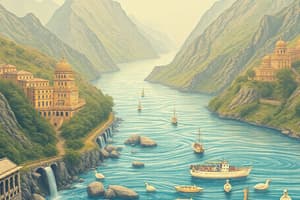Podcast
Questions and Answers
Which river joins the Ganga at Prayag (Allahabad)?
Which river joins the Ganga at Prayag (Allahabad)?
- Yamuna (correct)
- Damodar
- Mahananda
- Chambal
The Damodar River is part of the Ganga basin.
The Damodar River is part of the Ganga basin.
True (A)
What was the Damodar River once known as?
What was the Damodar River once known as?
sorrow of Bengal
The Chambal River rises near ______ in Madhya Pradesh.
The Chambal River rises near ______ in Madhya Pradesh.
Match the tributaries with their corresponding rivers:
Match the tributaries with their corresponding rivers:
Which glacier is the source of the Yamuna River?
Which glacier is the source of the Yamuna River?
The Mahananda River rises in the Darjeeling hills.
The Mahananda River rises in the Darjeeling hills.
What multipurpose project has helped tame the Damodar River?
What multipurpose project has helped tame the Damodar River?
What percentage of India's drainage area discharges its waters towards the Bay of Bengal?
What percentage of India's drainage area discharges its waters towards the Bay of Bengal?
All major river basins in India have a catchment area of more than 20,000 sq.km.
All major river basins in India have a catchment area of more than 20,000 sq.km.
Name one river system in India that discharges its waters into the Arabian Sea.
Name one river system in India that discharges its waters into the Arabian Sea.
_____ rivers are characterized by meltwater and precipitation, making them perennial.
_____ rivers are characterized by meltwater and precipitation, making them perennial.
Match the following river basins to their drainage characteristics:
Match the following river basins to their drainage characteristics:
Which of the following is NOT a characteristic of the Himalayan drainage system?
Which of the following is NOT a characteristic of the Himalayan drainage system?
The Brahmaputra river basin is classified as a medium river basin.
The Brahmaputra river basin is classified as a medium river basin.
What is the catchment area size classification for minor river basins?
What is the catchment area size classification for minor river basins?
Which glacier is the origin of the Ghaghara river?
Which glacier is the origin of the Ghaghara river?
The Brahmaputra river flows northeast after entering India.
The Brahmaputra river flows northeast after entering India.
What is the other name for the river Kali?
What is the other name for the river Kali?
The Ganga at Sonpur near Patna is known for joining the _______ river.
The Ganga at Sonpur near Patna is known for joining the _______ river.
What does the term 'Tsangpo' mean?
What does the term 'Tsangpo' mean?
Match the following rivers with their origin:
Match the following rivers with their origin:
The river Sarda joins the Ghaghara in the mountainous regions.
The river Sarda joins the Ghaghara in the mountainous regions.
What is the main left bank tributary that the Brahmaputra receives?
What is the main left bank tributary that the Brahmaputra receives?
What is the primary origin of large rivers flowing on the Peninsular plateau?
What is the primary origin of large rivers flowing on the Peninsular plateau?
The Kosi river is known for bringing a small quantity of sediments from its upper reaches.
The Kosi river is known for bringing a small quantity of sediments from its upper reaches.
What are some of the depositional features formed by these rivers when entering the plains?
What are some of the depositional features formed by these rivers when entering the plains?
The river Kosi is also known as the _______ of Bihar.
The river Kosi is also known as the _______ of Bihar.
Which of the following statements about the Indus river system is true?
Which of the following statements about the Indus river system is true?
The Ganga and Brahmaputra systems flow toward the Arabian Sea.
The Ganga and Brahmaputra systems flow toward the Arabian Sea.
What geological process allowed the Ganga and Brahmaputra rivers to flow towards the Bay of Bengal?
What geological process allowed the Ganga and Brahmaputra rivers to flow towards the Bay of Bengal?
Match the river systems with their descriptions:
Match the river systems with their descriptions:
Which river is known as the Dakshin Ganga?
Which river is known as the Dakshin Ganga?
The Narmada and Tapi rivers mainly flow from east to west.
The Narmada and Tapi rivers mainly flow from east to west.
What is the length of the Godavari river?
What is the length of the Godavari river?
The Western Ghats act as the ______ between the major Peninsular rivers.
The Western Ghats act as the ______ between the major Peninsular rivers.
Which of the following rivers is not part of the Ganga river system?
Which of the following rivers is not part of the Ganga river system?
Match the following rivers with their characteristics:
Match the following rivers with their characteristics:
Fifty-three percent of the drainage basin of the Godavari lies in Odisha.
Fifty-three percent of the drainage basin of the Godavari lies in Odisha.
The primary tributaries of the Godavari include Penganga, Indravati, and ______.
The primary tributaries of the Godavari include Penganga, Indravati, and ______.
Flashcards are hidden until you start studying
Study Notes
Drainage Systems in India
- Approximately 77% of India's drainage area, including major rivers like the Ganga, Brahmaputra, Mahanadi, and Krishna, is oriented towards the Bay of Bengal.
- The remaining 23% features rivers such as the Indus, Narmada, Tapi, Mahi, and Periyar that discharge into the Arabian Sea.
Classification of River Basins
- Major River Basins: Over 20,000 sq.km, includes 14 basins like Ganga, Brahmaputra, Krishna, Narmada, and Tapi.
- Medium River Basins: Between 2,000 - 20,000 sq.km, consists of 44 basins including Kalindi and Periyar.
- Minor River Basins: Less than 2,000 sq.km, contains rivers in low rainfall areas.
Himalayan Drainage System
- Major rivers originating in the Himalayas are perennial, fed by snowmelt and precipitation.
- Key rivers include the Ganga, Indus, and Brahmaputra, shaped by geological history and erosional activities as the Himalayas uplifted.
- Rivers form deep gorges and V-shaped valleys, and their courses are tortuous in mountainous areas but meander in plains.
River Characteristics and Sedimentation
- River Kosi, known as the 'sorrow of Bihar', frequently changes course due to heavy sediment deposition from upper reaches.
- The Kosi's changing course can cause significant flooding, emphasizing the need for flood management.
Major River Systems
- Indus System: Covers 1,165,000 sq.km with a length of 2,880 km; known as the Sindhu in its upper reaches.
- Yamuna River: Originates from Yamunotri glacier; joins Ganga at Prayag, its tributaries include Chambal and Sarda.
- Brahmaputra System: Rises at Chemayungdung glacier, traverses 1,200 km in Tibet as Tsangpo, enters India in Arunachal Pradesh, and becomes known as Brahmaputra.
Evolution of Peninsular Drainage System
- Shaped by three major geological events leading to subsidence and re-formation of river patterns.
- Peninsular rivers, primarily flowing from west to east, include Godavari, Mahanadi, Krishna, and Kaveri.
- The Narmada and Tapi are exceptions, flowing westward through rift valleys.
Godavari River
- The longest Peninsular river at 1,465 km, often referred to as the Dakshin Ganga, with a significant catchment area over 313,000 sq.km.
- Discharges into the Bay of Bengal, traversing various states including Maharashtra and Andhra Pradesh.
Key River Attributes
- Peninsular rivers exhibit a fixed course and do not meander significantly.
- They have varied flows; while most are non-perennial, Narmada and Tapi feature some level of perennial flow due to their unique geological formations.
Studying That Suits You
Use AI to generate personalized quizzes and flashcards to suit your learning preferences.




